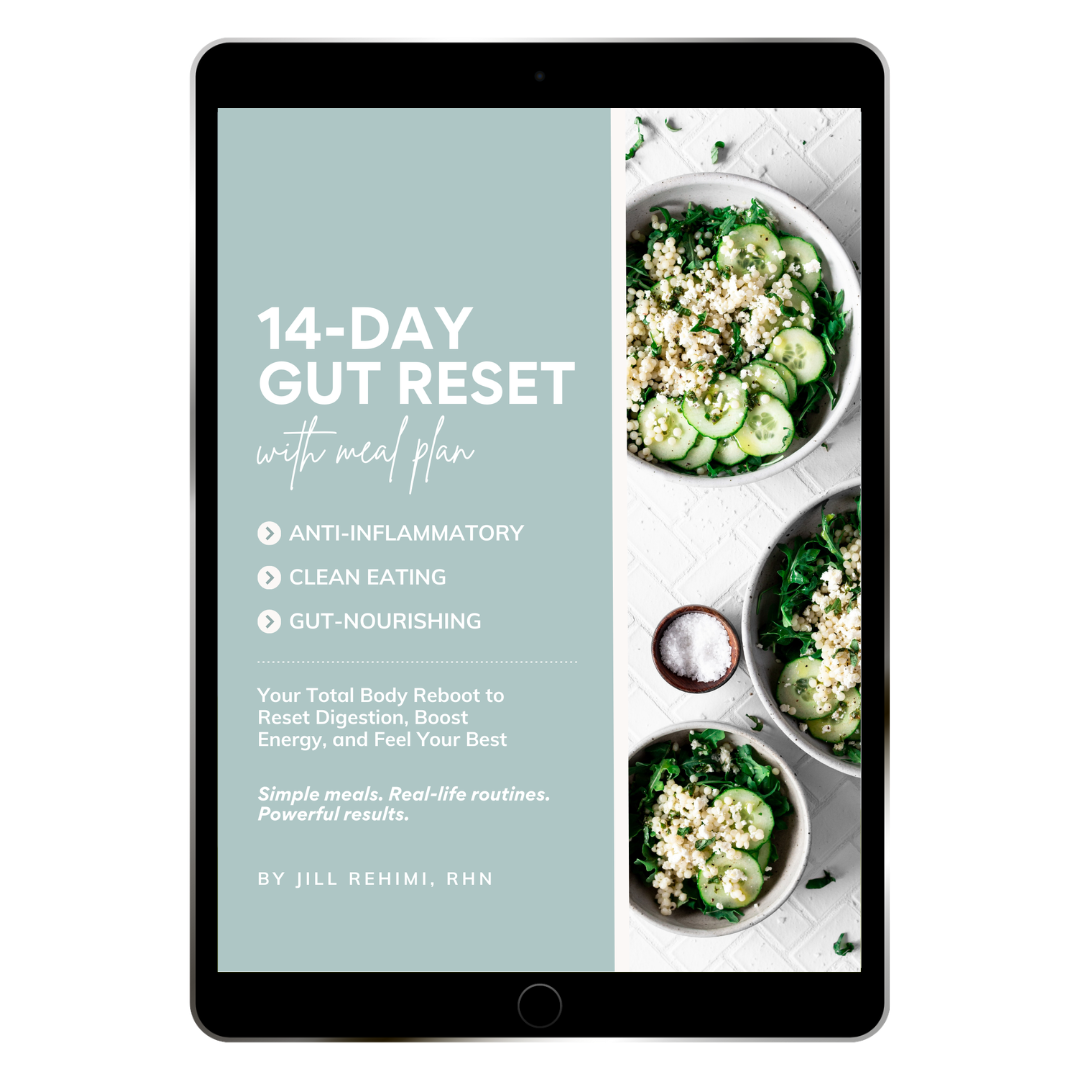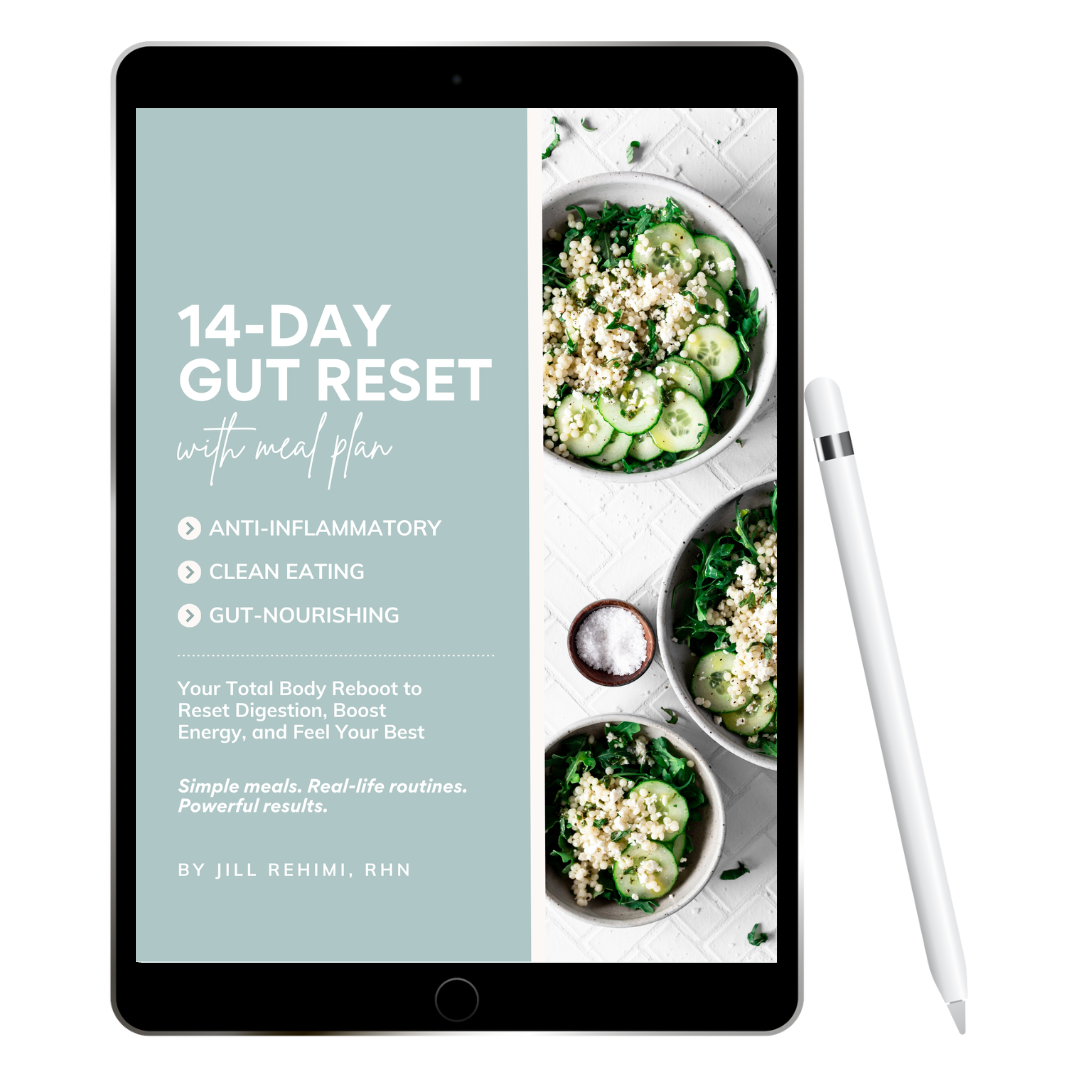The Top 5 Gut Health Myths Debunked

By Jill Rehimi, Registered Holistic Nutritionist
When you’re struggling with symptoms like bloating, constipation, and fatigue, it’s easy to feel overwhelmed by all the gut health advice out there. But not everything you hear is true—or even helpful. Let’s clear up five common gut health myths so you can take charge of your symptoms and start feeling like yourself again.
Myth #1: Probiotics are a Cure-All for Gut Health
Probiotics get a lot of buzz, and while they can be beneficial, they’re not a one-size-fits-all solution. The idea that popping a probiotic pill will solve all your gut issues is, unfortunately, just wishful thinking. Everyone’s gut microbiome is unique, and what works for one person might not work for another.
In addition, not all probiotics are created equal. There are a lot of factors that go into knowing and deciding the correct type, quality, and strain that is right for your symptoms. The right probiotics may help alleviate symptoms like bloating and gas, but it’s about finding the right balance of foods and habits that help you feel better overall. This might include probiotics, but it also involves nourishing your body in other ways to address the root of your symptoms.
Myth #2: A Gluten-Free Diet is Essential for Everyone
It’s true that some people need to avoid gluten due to celiac disease or gluten intolerance. But for most people, a gluten-free diet isn’t necessary—and it can sometimes do more harm than good. Many gluten-free products are highly processed, packed with preservatives, and loaded with sugar, which can worsen symptoms like bloating or fatigue. They might be free of gluten, but they’re not necessarily good for your gut.
If you’re choosing gluten-free to feel healthier, try focusing on whole, unprocessed foods that genuinely support your digestion and energy levels. You might find that eating foods that fuel you, rather than just avoiding gluten, makes a bigger difference in how you feel day to day.
Myth #3: Quick-Fix Cleanses Will Detoxify Your Gut
Detoxing sounds great, doesn’t it? Who wouldn’t want to flush out all the “bad stuff” and start fresh? But here’s the truth: quick-fix cleanses, powders, and teas often promise more than they deliver. Many of these cleanses work by forcing your body to eliminate waste quickly, which might give you the illusion of a reset, but it’s not addressing the underlying issues that cause symptoms like bloating and constipation. In fact, these products can exacerbate inflammation, making it harder for your digestive system to function properly.
A true digestive reset involves gently removing irritants from your diet and supporting your body’s natural detoxification processes. It’s not about quick fixes—it’s about making sustainable changes that help you feel better in the long run.
Myth #4: Constipation Only Means Hard Stools
Constipation is one of those symptoms that people don’t like to talk about, but it’s more common than you might think—in fact, approximately 1 in 4 people struggle with chronic constipation. While many people equate constipation with sitting on the toilet straining or hard-to-pass firm stools, it can actually manifest in various ways. You might have infrequent bowel movements, meaning you don’t eliminate your meal within 18 to 24 hours, feel incomplete emptying after a bowel movement, or experience a lot of straining even if your stool is soft.
Understanding what constipation really looks like can help you find the right approach to relieve it. It’s not just about eating more fibre, either. Although fibre can help, we don’t want to add more bulk to an already backed-up situation. Instead, it’s about finding a balance in your diet, staying hydrated, and making lifestyle changes that support healthy digestion.
Myth #5: IBS is Just a “Sensitive Stomach”
If you’ve ever been told that IBS is just a “sensitive stomach,” you know how frustrating it is to have your symptoms downplayed. IBS is a complex condition that can involve abdominal pain, bloating, gas, and changes in bowel habits, and it’s not something that can be solved by just eating a little more mindfully.
Managing IBS involves understanding your unique triggers, adjusting your diet, and focusing on lifestyle habits that reduce stress and support your gut. It’s not about “fixing” a sensitive stomach—it’s about getting to the root of your symptoms so you can feel better and reclaim your quality of life.
Taking Charge of Your Symptoms
By debunking these myths, you’re already taking a step toward understanding what your body really needs. If you’re tired of dealing with the discomfort and ready for a change, I’m here to help you find relief.
Start with The 14-Day Gut Reset, which provides practical steps to reduce symptoms and boost your energy.
Or, if you're ready to explore what life could look like without dealing with your symptoms any longer, Book a Private Coaching Session with me today to get personalized support. Let’s work together to make these myths a thing of the past—and your symptoms, too.
About the Author
Jill Rehimi is a Registered Holistic Nutritionist and Natural Nutrition Clinical Practitioner. She is passionate about empowering you to achieve your health goals through personalized nutrition and lifestyle strategies. With years of experience and a client-centric approach, she believes that everyone has the potential to thrive when their gut health is prioritized.




